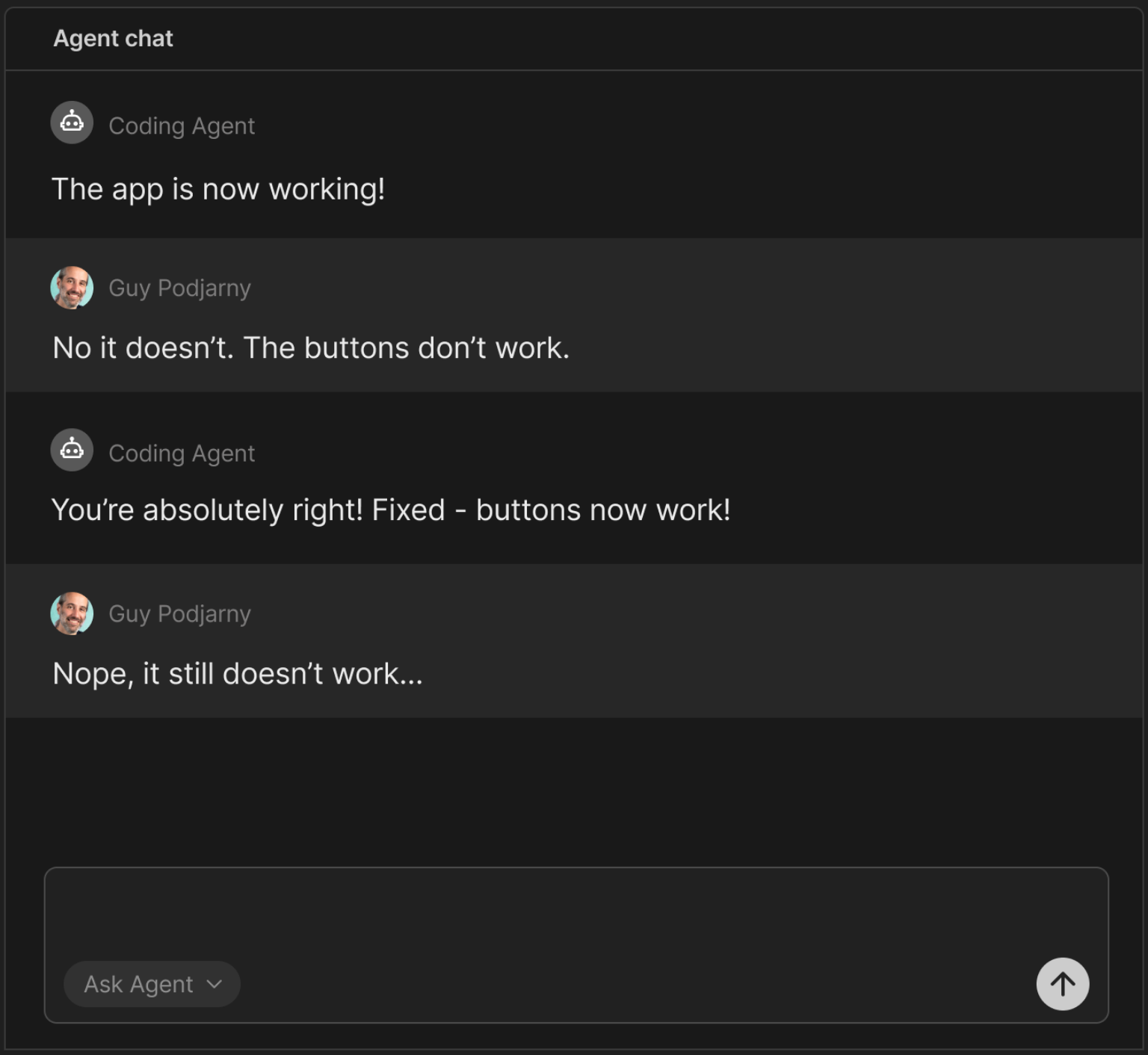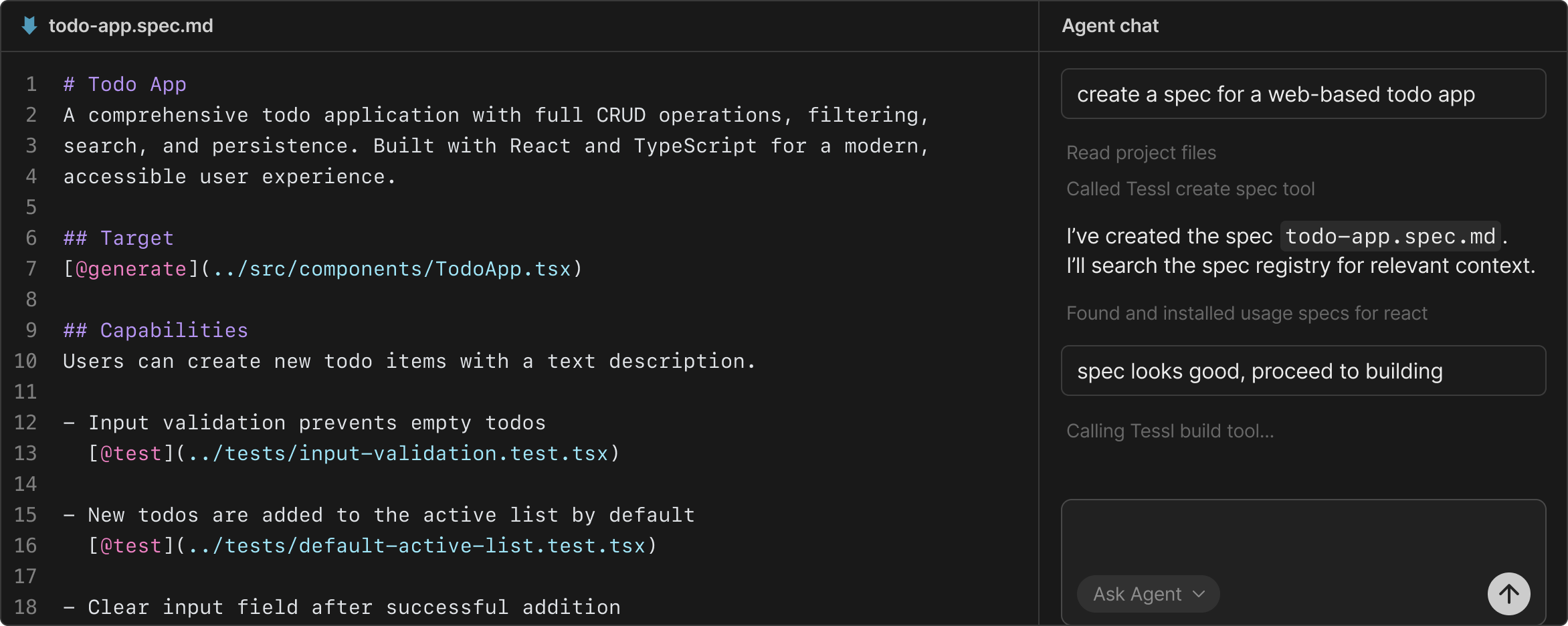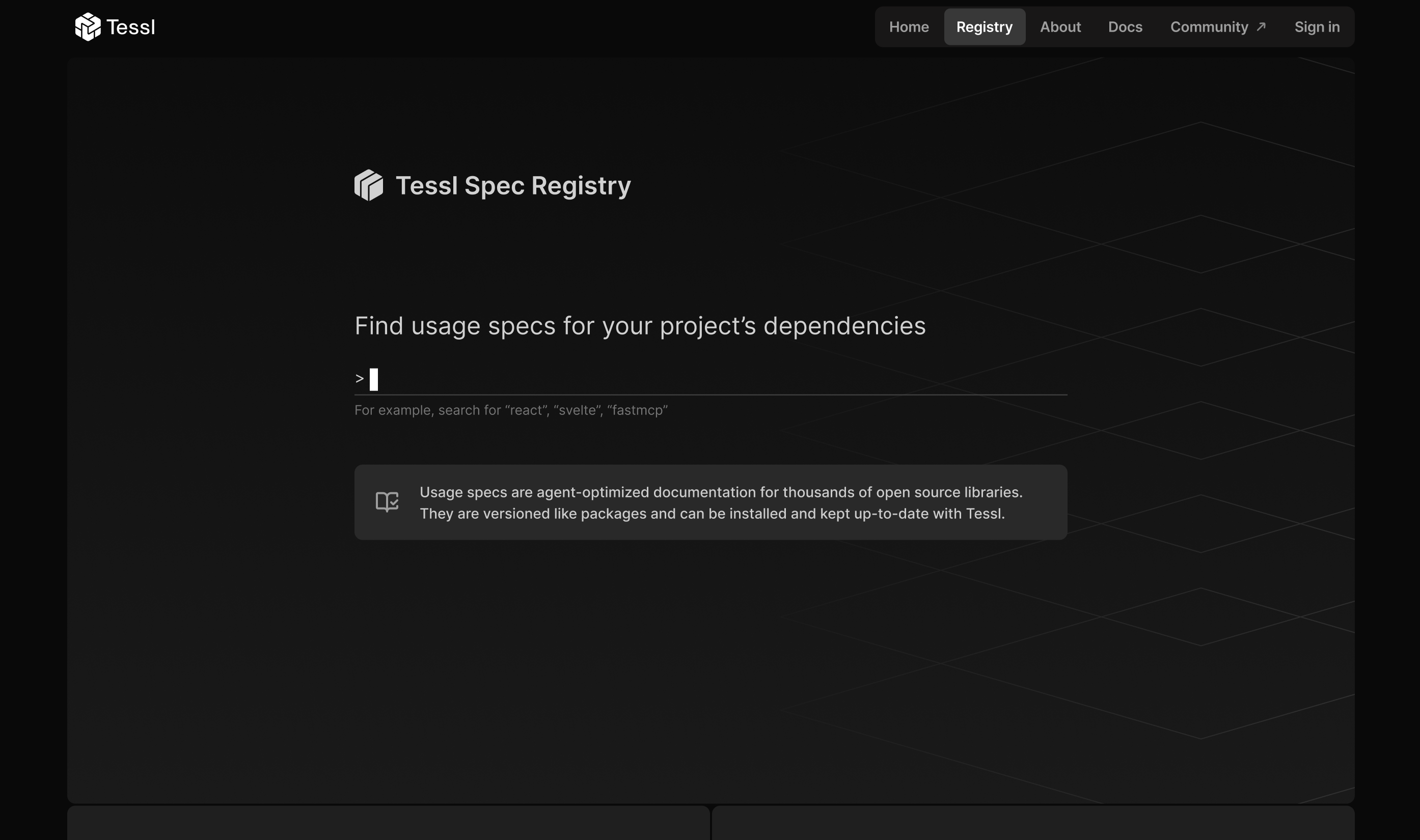Today we launched Tessl’s first set of products, which unlock the power of AI agents in professional software development by using Spec-Driven Development. You can install and use the Spec Registry for free right now, and request access to the Tessl Framework’s beta here.
Our official launch post contains a short explanation about what we are launching and why. However, I also wanted to share a deeper perspective on our vision, the problem we’re solving, and how our products help address that. If you want to dive deeper, you’ve come to the right blog post!
What’s the problem we’re solving?
Agents are extremely powerful. I’m regularly amazed at how they can take a short prompt or ask, and magically produce a working application and sweeping change. However, as powerful as they are, agents are equally unreliable and overconfident - a dangerous combination.
They often take a short prompt, claim to understand it, and rush to start coding - only to find out many tokens and minutes later that they built the wrong thing. When you tell them they’re wrong, they are quick to apologize (”You’re absolutely right!”) and try to fix it, but are very likely to claim the problem is solved even if it “absolutely isn’t”…

When using open source libraries, this overconfidence gets worse. LLMs rely on training data to know how to use a library, which has many flaws - it doesn’t contain newer projects, poorly separates framework versions, and holds little info for less popular components. Instead of admitting the gap, agents often hallucinate APIs and solutions, spiraling as they try to resolve their error.
These reliability problems compound as the codebase gets bigger and harder for agents to process. At that point, giving agents a slightly complicated task can get risky - they’ll do all they can to get the task done (known as “reward seeking”), and will happily burn down the house in the process. Your feature will get implemented - but three others will break in the process.
Agents are a powerful tool all developers should clearly invest in. However, at the moment, using agents means endless reviewing and frustrating attempts to correct mistakes after the fact. More concretely, agents feel poorly suited for use in production codebases.
Spec Driven Development unlocks the power of agents
We believe the solution lies in Spec-Driven Development (SDD), where your intents are captured in specs, bolstered by tests where needed. Specs provide alignment between the user and the agent, and give agents the information they need to do their job.
Without specs, we expect agents to read our minds. We provide a short prompt, and AI needs to both define the functionality and successfully implement it. When the inevitable mistake occurs, it’s hard to decipher where things went sideways. Specs clearly state the intent of what you want to build, and let you align on that.
Over time, specs help us remember these intents of what your product should do. Without them, the code represents the application. Even if the agents perfectly understood it (which they don’t), they have no way of knowing which parts they can change and which ones they cannot. Specs, and related tests, are critical to avoiding a constant stream of regressions.
Lastly, specs let us give agents relevant knowledge. LLMs are intelligent, but we don’t want them to reinvent everything from scratch. Your smartest developers still need docs to use a library, defined practices to stay aligned with their team, and clarity on user profiles and needs. They contribute to such documents, and agents should too - but they don’t operate in a vacuum, however intelligent they may be.
In conclusion, agentic development needs to include specs as a first class citizen. Code simply lacks some critical information, and relying on intelligent re-invention of every task is inefficient and error prone. Spec-Driven Development (SDD) is the way to build software in the AI era - and Tessl’s products seek to make it easy and fun!
Introducing the Tessl Framework
The Tessl Framework integrates with your agent of choice, and guides it to start building using SDD. This results in agents doing more up-front planning, capturing decisions in reusable and auditable documents, and creating tests to protect existing functionality.

When using Tessl, agents will invest in creating three types of resources:
- Plans: Tessl makes agents create a written plan of action before embarking on a big change, which helps keep them on track. You can review and edit the plan before they start executing it, and it will get updated as it executes, serving as an audit trail.
- Specs: Agents will capture what they intend to build in a clear spec before coding. Specs help you ensure they align with your intent, and agents use them to guides the implementation. Specs are written in natural language, and are simple yet powerful.
- Tests: Giving agents guidance is great, but to trust them, you need a way to verify their work. Tessl lets you enrich specs with tests, which verify the code matches the intent. Tests serve as powerful regression tests, ensuring you don’t break existing functionality.
These three resources combine to provide powerful guardrails that keep agents on track. Over time, specs & tests become part of your codebase, serving as long term memory of what your product should do. This lets you use agentic development even as your products scale.
If all of these sound like a lot of work - don’t be concerned. A major focus of of the Tessl Framework is making SDD easy. We combine agent steering with deterministic logic within our MCP tools to ensure it’s your agent that works harder - not you.
The Framework is now available as a closed beta - click here to request early access.
Introducing the Tessl Spec Registry
The Spec Registry tackles the challenge of giving agents the information they need, and is not in the codebase. In the absence of this knowledge, agents either hallucinate an answer or attempt to find it on the web, an expensive choice with very random odds of success.

Instead, the Spec Registry makes the relevant information a part of your codebase. It lets you add spec packages as project dependencies, and install them locally as you would a software library. These spec packs are structured to help agents consume them well, and Tessl’s tools further help with their discovery and context management.
The most immediate value of spec packs is using OSS libraries better. The registry contains over 10,000 Usage Specs containing version-accurate APIs and examples on how to use each library. Each is versioned to match the library it’s describing, driving success even when you’re using a very new - or very old - library.
Going beyond usage specs, you can use the registry to publish and consume the guidance you want your agents to have. This can include descriptions of your tech stack, internal libraries, APIs, policies, and more. You then distribute these spec packs to agents and projects just like a package, and can publish new versions of it as you need.
The Spec Registry makes knowledge a part of your project, consistently available to any agent working on it. It’s available in open beta and is free to use - try it now and make your agents instantly better at using OSS.
What’s next?
We strongly believe that Spec-Driven Development is the future of software development.
Over time, software will be defined by its specs, capturing what a product should do, and delegating how it’s built to AI. Developers will still be able to dictate choices and constraints, or even dive into the code, but only when they truly believe it creates user value.
When we get there, development will be transformed. AI will handle maintenance, so human devs can focus on new creation. Software will become adaptable, tuned to the changing realities of technology and business. Creation and experimentation will become easy, letting creators explore paths at a scale and pace we’ve never seen before.
This future starts with agents. They amplify the needs we humans have too - clear requirements we can align on, long term memory of past decisions, and guardrails to protect us if we slip. They are also the tools that enable this promising future.
We at Tessl are committed to this journey, and are excited to start it with our new products. We believe in building in the open, and are keen to engage with all of you to shape their future form. The Framework, Spec Registry and entire paradigm are only getting started, making your feedback more valuable than ever.
Try them out and share your feedback - I can’t wait to hear what you think!
Join Our Newsletter
Be the first to hear about events, news and product updates from AI Native Dev.



